|
|
| Experimental efforts |
| An important factor for the understanding of prehistoric procedures is constituted by experimental efforts, which aim to check the correctness of the interpretations that arise from the excavation and the study of the material. |
| |
| Field experiments |
| During the 2001 excavation season, pebbles from neighbouring streams were heated in fire and rapidly cooled in water in order to determine whether the numerous cracked pebbles found in some of the Neolithic layers were perhaps used in the heating of water for cooking. The experiment showed that the heating and cooling processes not only created cracks, they also changed the magnetic properties of the pebbles. And so this may explain the high incidence of pebbles recorded in certain Neolithic layers. |
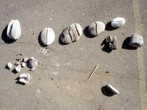 Of course the effect of heat depends on the type of the stone, a fact which must be investigated further before any final conclusions are drawn. In any case, the probable use of heated stones is particularly interesting as regards cooking techniques and the daily practices of the Neolithic inhabitants of Paliambela. Experimental efforts related to the reproduction of prehistoric stone technologies are also planned to be undertaken within the framework of the running of the archaeological park. Of course the effect of heat depends on the type of the stone, a fact which must be investigated further before any final conclusions are drawn. In any case, the probable use of heated stones is particularly interesting as regards cooking techniques and the daily practices of the Neolithic inhabitants of Paliambela. Experimental efforts related to the reproduction of prehistoric stone technologies are also planned to be undertaken within the framework of the running of the archaeological park. |
| |
| Ceramic technology |
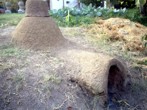 Under the supervision of Professor K. Kotsakis, an important study in the field of prehistoric ceramic technology has been undertaken which has led to interesting conclusions concerning the techniques and practices of traditional pottery-making, practices that have been totally forgotten in our time. In particular, the technology of cooking vessels and the techniques of baking have been recreated with a fair amount of precision in the laboratory. Under the supervision of Professor K. Kotsakis, an important study in the field of prehistoric ceramic technology has been undertaken which has led to interesting conclusions concerning the techniques and practices of traditional pottery-making, practices that have been totally forgotten in our time. In particular, the technology of cooking vessels and the techniques of baking have been recreated with a fair amount of precision in the laboratory. 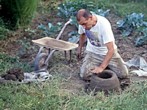 The study of the pottery from Makrygialos, which was funded for three years (1999-2001) by the Institute of Aegean Prehistory, must be mentioned here. At Paliambela experiments copying the baking conditions of specific types of Neolithic pottery are being carried out in collaboration with the local potter Giannis Stangides. The study of the pottery from Makrygialos, which was funded for three years (1999-2001) by the Institute of Aegean Prehistory, must be mentioned here. At Paliambela experiments copying the baking conditions of specific types of Neolithic pottery are being carried out in collaboration with the local potter Giannis Stangides. |
| |
| Experimental cultivation |
Another effort that is planned to be developed concerns experimental pre-industrial cultivation. Techniques and practices that are thought to have been used in the Neolithic period will be used in these farming experiments, and pre-industrial varieties will be cultivated with an emphasis on those that have been found in the archaeological remains at Paliambela. The reconstruction of the cultivation practices of the distant past aims at the better understanding of the conditions and productivity of the Neolithic economy. Similar long-term experimental farming initiatives are planned for certain types of trees, for which there is excavated evidence for their existence and indications of their systematic exploitation (e.g. cropping).
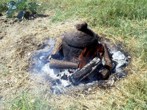 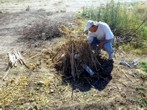
|
|
|





